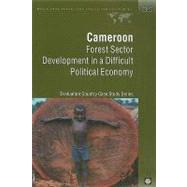Cameroon : Forest Sector Development in a Difficult Political Economy
, by Essama-Nssah, B.; Gockowski, James Jerome- ISBN: 9780821347607 | 0821347608
- Cover: Paperback
- Copyright: 7/1/2000
This country case study, part of the Operations Evaluation Department (OED) A Review of the 1991 World Bank Forest Strategy and Its Implementation, evaluates World Bank operations in Cameroon for their consistency with the strategy. The strategic aspects of those operations are judged here on their relevance, effectiveness, efficiency, institutional development, and sustainability. The fundamental objective of the forest policy reform in Cameroon was to establish a transparent, equitable, and sustainable management system for forest resources. The outcome of the reform process was limited, for four reasons. First, the government of Cameroon lacked genuine commitment and the capacity to carry out the reform. Second, key actors in the reform process (particularly foreign logging companies and the parliament) chose to oppose it. Third, partners such as the World Bank failed to devise an implementation strategy compatible with the underlying dynamics of political and socioeconomic changes in Cameroon. Finally, while Cameroon's forest policy is well codified in documents, it is poorly implemented. Although the reforms have led to increased tax revenues and increased the share of GDP attributable to the forest sector, the structural underpinnings of the sector have been little affected. Government agencies in the sector continue to be weak. The international logging companies that dominate the sector continue to have a free hand in the development and use of the forest resources of Cameroon. Local communities were left out of the reform process, despite the declared objective to include them in forest resource management. Overall, the interventions of the Bank inside and outside the forest sector in Cameroon were relevant to its strategic objectives, but they were neither efficacious nor efficient. Because of weak institutional development, the achievements are unlikely to be sustained. The Bank should focus its future reform efforts in Cameroon on the collection and dissemination of relevant and reliable information, working with a larger set of stakeholders, and using more Cameroonian expertise to gain local perspective and build capacity. The success of such an approach hinges on government commitment and the cooperation of other donor countries, including those with timber interests in Cameroon.







